Technologies
Oura Ring’s ‘Circles’ Makes Sharing Sleep and Other Scores Possible
As long as they also wear an Oura ring, you can share health data including Sleep, Readiness and Activity scores with friends and family. Here’s how.
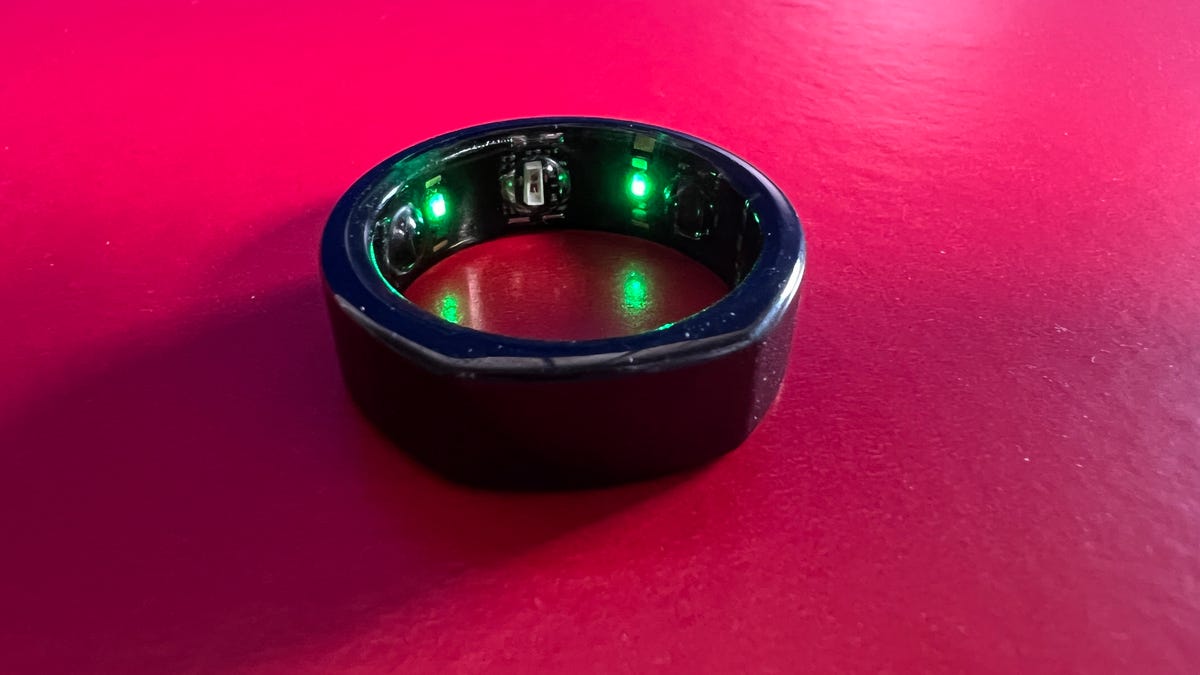
If you’ve ever wondered how well your coworker slept last night, now you can know for sure as long as you’re connected with them through Circles, a new feature Oura announced Thursday for its app.
Oura, the health-tracking ring that collects data such as temperature, heart rate, blood oxygen readings, summarizes that information into Readiness, Sleep and Activity scores. With Circles, you’ll be able to share those scores with up to 10 groups of people or «Circles,» with a maximum of 20 people in each group.
You’ll be able to choose which kind of data or scores you share with each group, so one circle can get more of your wellness information than another. While only three scores are available to share through Circles now, Oura said it plans on expanding sharable information in the future.
To start a circle, open the Oura app, scroll down the main menu and select «Circles.» Then you can name a circle, decide what scores you want to share and also decide whether you want that data to be daily or weekly averages. To invite people into the circle (they have to be fellow Oura users), you’ll send them a one-time link.
Once you’ve started your circle, you can view their scores and «react» with emojis, if you choose. Everyone has to sync their rings to keep the scores visible.
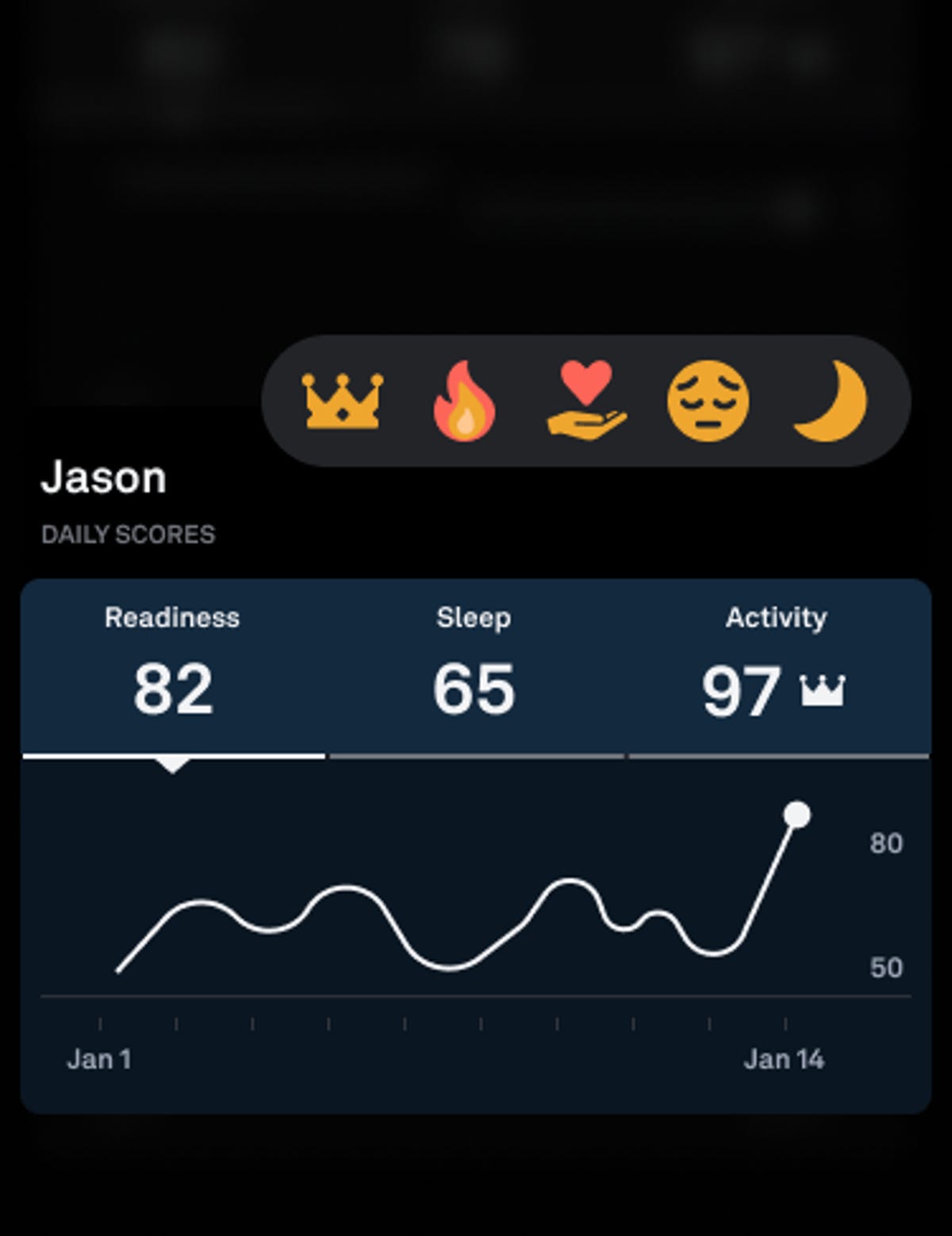
What it looks like to react to your friend in Circles.
For people who enjoy collecting health data (and maybe boasting about a good health week), Oura’s Circles features is a good way to do that with other Oura wearers. According to a press release, though, the company is positioning Circles as another way to check in and connect with each other — an increasingly important public health goal amid a loneliness epidemic, which has impacts on sleep, mental health and physical illness.
«Our mission at Oura has always been to improve the lives of our members by taking a compassionate approach to health, and this new feature is just the next step in delivering a personalized experience that allows our members to connect with not only their bodies, but also their friends and family,» Oura CEO Tom Hale said in a statement.
Oura’s Circles announcements comes as the company is advancing its new sleep staging algorithm out of beta mode, which means everyone tracking sleep stages with Oura will get data from the improved algorithm. Shyamal Patel, the company’s head of science, calls the new algorithm a «massive improvements of accuracy» in sleep data. The new algorithm has 79% agreement with polysomnography sleep tests done in a clinic, Patel told CNET.
Compared to Oura’s older sleep-tracking algorithm, ring wearers might experience slight changes in the amount of time Oura tells you you’re spending in deep sleep versus light sleep versus REM sleep.
«Those numbers are likely to shift a little bit,» Patel said.
For more on the Oura ring, read more about how the tracker can tell you whether you’re a morning person and how the Oura ring compares to the Apple Watch as a sleep tracker. Also, here’s our thorough review of Oura, the wearable that can tell when you’re sick.
Technologies
Today’s NYT Strands Hints, Answers and Help for Feb. 7 #706
Here are hints and answers for the NYT Strands puzzle for Feb. 7, No. 706.
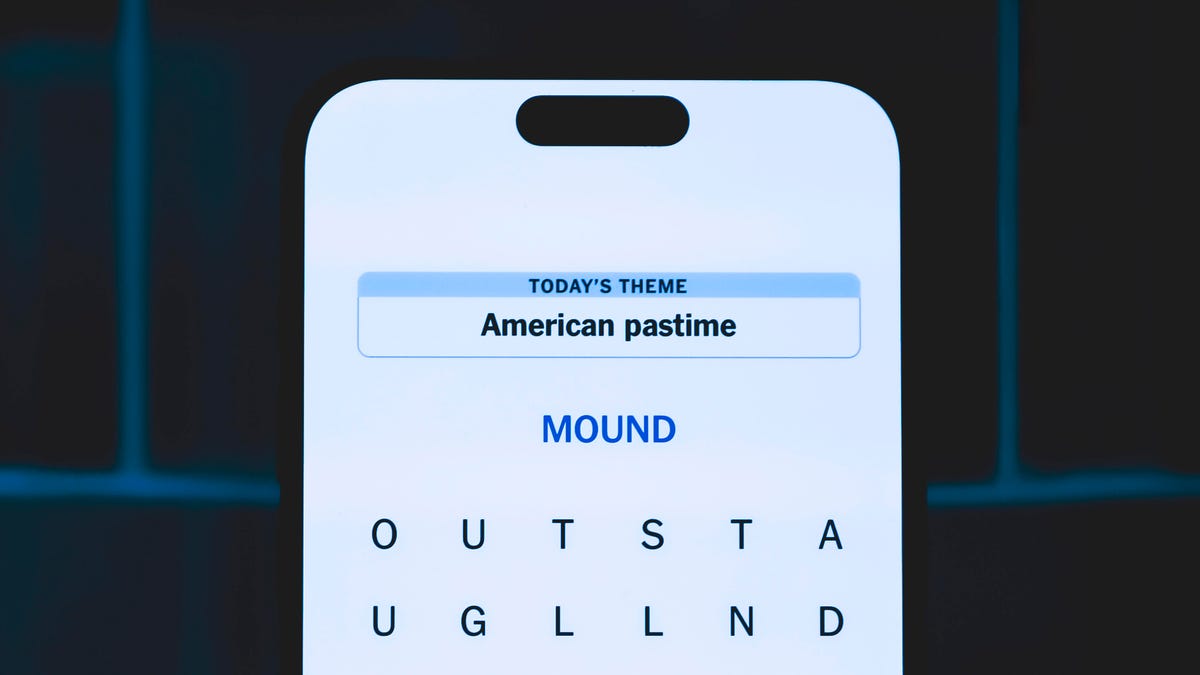
Looking for the most recent Strands answer? Click here for our daily Strands hints, as well as our daily answers and hints for The New York Times Mini Crossword, Wordle, Connections and Connections: Sports Edition puzzles.
Today’s NYT Strands puzzle is especially tricky, as a variety of words could fit the theme. Some of the answers are difficult to unscramble, so if you need hints and answers, read on.
I go into depth about the rules for Strands in this story.
If you’re looking for today’s Wordle, Connections and Mini Crossword answers, you can visit CNET’s NYT puzzle hints page.
Read more: NYT Connections Turns 1: These Are the 5 Toughest Puzzles So Far
Hint for today’s Strands puzzle
Today’s Strands theme is: Boo-o-o-o-ring
If that doesn’t help you, here’s a clue: Zzzz… not very exciting.
Clue words to unlock in-game hints
Your goal is to find hidden words that fit the puzzle’s theme. If you’re stuck, find any words you can. Every time you find three words of four letters or more, Strands will reveal one of the theme words. These are the words I used to get those hints but any words of four or more letters that you find will work:
- HIND, DATE, DRUM, MOST, CHIN, PAIN, RAIN, NOSE, TOME, TOMES
Answers for today’s Strands puzzle
These are the answers that tie into the theme. The goal of the puzzle is to find them all, including the spangram, a theme word that reaches from one side of the puzzle to the other. When you have all of them (I originally thought there were always eight but learned that the number can vary), every letter on the board will be used. Here are the nonspangram answers:
- DULL, DREARY, HUMDRUM, MUNDANE, TIRESOME
Today’s Strands spangram
Today’s Strands spangram is WATCHINGPAINTDRY. To find it, start with the W that’s three letters up from the bottom on the far-left row, and wind up, across and down.
Toughest Strands puzzles
Here are some of the Strands topics I’ve found to be the toughest.
#1: Dated slang. Maybe you didn’t even use this lingo when it was cool. Toughest word: PHAT.
#2: Thar she blows! I guess marine biologists might ace this one. Toughest word: BALEEN or RIGHT.
#3: Off the hook. Again, it helps to know a lot about sea creatures. Sorry, Charlie. Toughest word: BIGEYE or SKIPJACK.
Technologies
Spotify Launches ‘About the Song’ Beta to Reveal Stories Behind the Music
The stories are told on swipeable cards as you listen to the song.
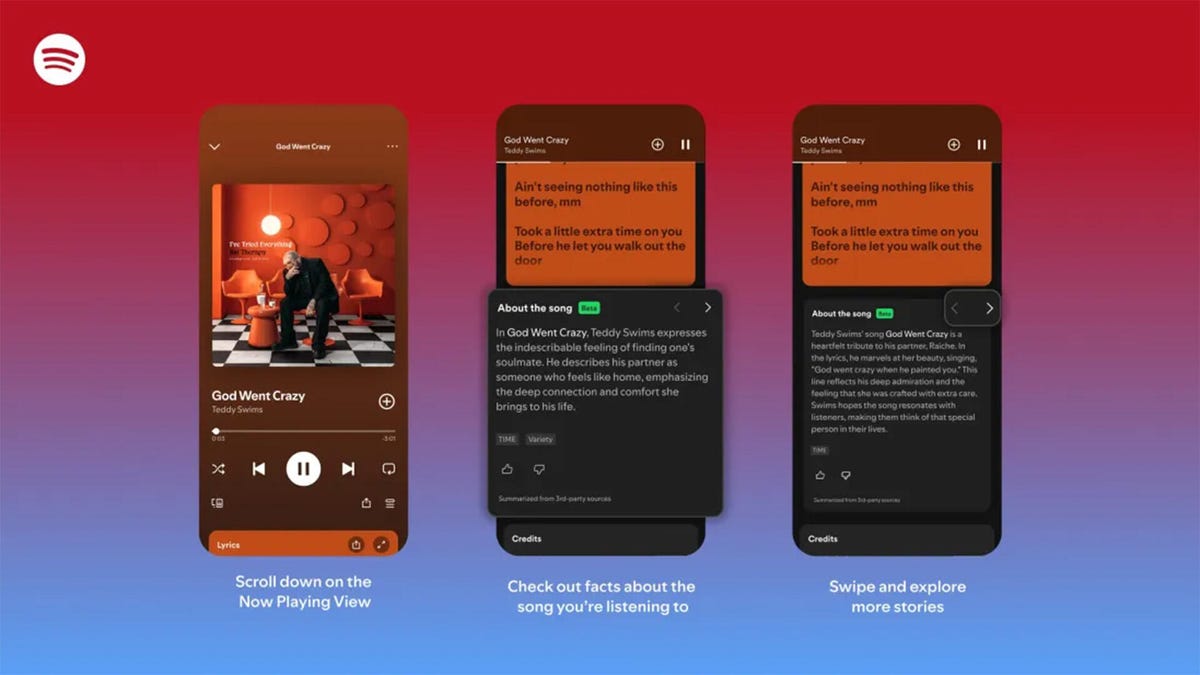
Did you know Chappell Roan drew inspiration for her hit song Pink Pony Club from The Pink Cadillac, the name of a hot-pink strip club in her Missouri hometown? Or that Fountains of Wayne’s song Stacy’s Mom was inspired by a confessed crush a friend had on the late co-founder Adam Schlesinger’s grandmother?
If you’re a fan of knowing juicy little tidbits about popular songs, you might find more trivia in About the Song, a new feature from streaming giant Spotify that’s kind of like the old VH1 show Pop-Up Video.
About the Song is available in the US, UK, New Zealand and Australia, initially for Spotify Premium members only. It’s only on certain songs, but it will likely keep rolling out to more music. Music facts are sourced from a variety of websites and summarized by AI, and appear below the song’s lyrics when you’re playing a particular song.
«Music fans know the feeling: A song stops you in your tracks, and you immediately want to know more. What inspired it, and what’s the meaning behind it? We believe that understanding the craft and context behind a song can deepen your connection to the music you love,» Spotify wrote in a blog post.
While this version of the feature is new, it’s not the first time Spotify has featured fun facts about the music it plays. The streaming giant partnered with Genius a decade ago for Behind the Lyrics, which included themed playlists with factoids and trivia about each song. Spotify kept this up for a few years before canceling due to multiple controversies, including Paramore’s Hayley Williams blasting Genius for using inaccurate and outdated information.
Spotify soon started testing its Storyline feature, which featured fun facts about songs in a limited capacity for some users, but was never released as a central feature.
About the Song is the latest in a long string of announcements from Spotify, including a Page Match feature that lets you seamlessly switch to an audiobook from a physical book, and an AI tool that creates playlists for you. Spotify also recently announced that it’ll start selling physical books.
How to use About the Song
If you’re a Spotify Premium user, the feature should be available the next time you listen to music on the app.
- Start listening to any supported song.
- Scroll down past the lyrics preview box to the About the Song box.
- Swipe left and right to see more facts about the song.
I tried this with a few tracks, and was pleased to learn that it doesn’t just work for the most recent hits. Spotify’s card for Metallica’s 1986 song Master of Puppets notes the song’s surge in popularity after its cameo in a 2022 episode of Stranger Things. The second card discusses the band’s album art for Master of Puppets and how it was conceptualized.
To see how far support for the feature really went, I looked up a few tracks from off the beaten path, like NoFX’s The Decline and Ice Nine Kills’ Thank God It’s Friday. Spotify supported every track I personally checked.
There does appear to be a limit to the depth of the fun facts, which makes sense since not every song has a complicated story. For those songs, Spotify defaults to trivia about the album that features the music or an AI summary of the lyrics and what they might mean.
Technologies
Today’s NYT Connections: Sports Edition Hints and Answers for Feb. 7, #502
Here are hints and the answers for the NYT Connections: Sports Edition puzzle for Feb. 7, No. 502.
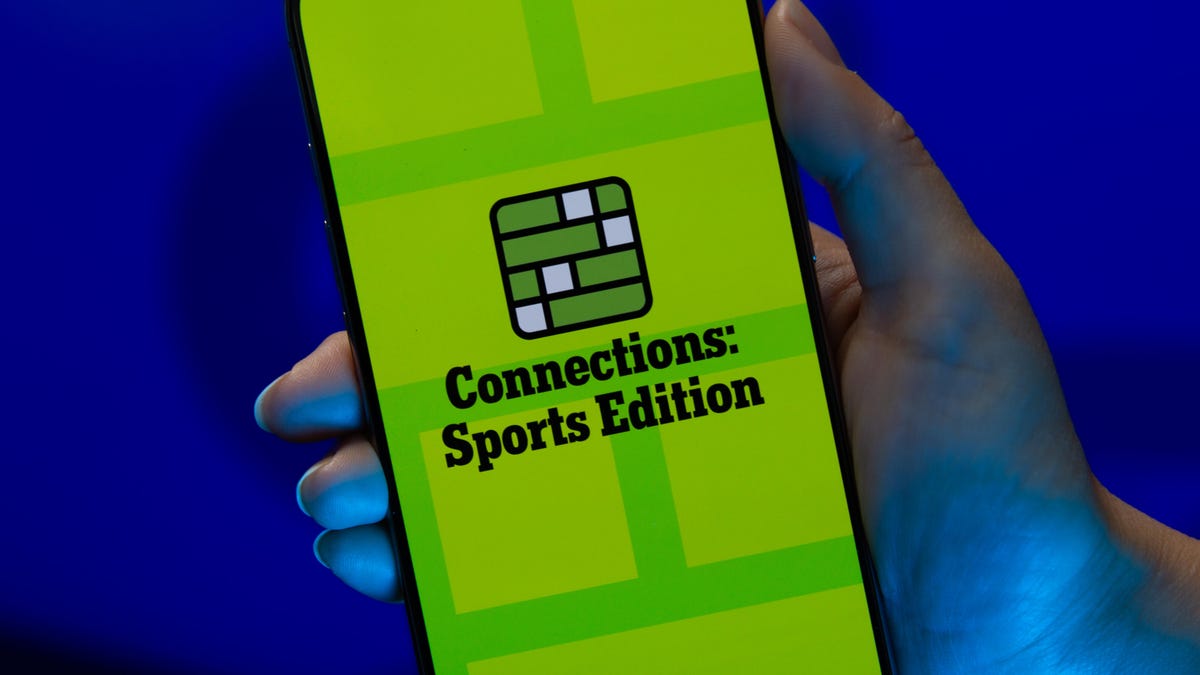
Looking for the most recent regular Connections answers? Click here for today’s Connections hints, as well as our daily answers and hints for The New York Times Mini Crossword, Wordle and Strands puzzles.
Today’s Connections: Sports Edition features a fun batch of categories. The purple one requires you to find hidden words inside some of the grid words, but they’re not too obscure. If you’re struggling with today’s puzzle but still want to solve it, read on for hints and the answers.
Connections: Sports Edition is published by The Athletic, the subscription-based sports journalism site owned by The Times. It doesn’t appear in the NYT Games app, but it does in The Athletic’s own app. Or you can play it for free online.
Read more: NYT Connections: Sports Edition Puzzle Comes Out of Beta
Hints for today’s Connections: Sports Edition groups
Here are four hints for the groupings in today’s Connections: Sports Edition puzzle, ranked from the easiest yellow group to the tough (and sometimes bizarre) purple group.
Yellow group hint: Golden Gate.
Green group hint: It’s «Shotime!»
Blue group hint: Same first name.
Purple group hint: Tweak a team name.
Answers for today’s Connections: Sports Edition groups
Yellow group: Bay Area teams.
Green group: Associated with Shohei Ohtani.
Blue group: Coaching Mikes.
Purple group: MLB teams, with the last letter changed.
Read more: Wordle Cheat Sheet: Here Are the Most Popular Letters Used in English Words
What are today’s Connections: Sports Edition answers?
The yellow words in today’s Connections
The theme is Bay Area teams. The four answers are 49ers, Giants, Sharks and Valkyries.
The green words in today’s Connections
The theme is associated with Shohei Ohtani. The four answers are Decoy, Dodgers, Japan and two-way.
The blue words in today’s Connections
The theme is coaching Mikes. The four answers are Macdonald, McCarthy, Tomlin and Vrabel.
The purple words in today’s Connections
The theme is MLB teams, with the last letter changed. The four answers are Angelo (Angels), Cuba (Cubs), redo (Reds) and twine (Twins).
-

 Technologies3 года ago
Technologies3 года agoTech Companies Need to Be Held Accountable for Security, Experts Say
-

 Technologies3 года ago
Technologies3 года agoBest Handheld Game Console in 2023
-

 Technologies3 года ago
Technologies3 года agoTighten Up Your VR Game With the Best Head Straps for Quest 2
-

 Technologies4 года ago
Technologies4 года agoBlack Friday 2021: The best deals on TVs, headphones, kitchenware, and more
-

 Technologies5 лет ago
Technologies5 лет agoGoogle to require vaccinations as Silicon Valley rethinks return-to-office policies
-

 Technologies5 лет ago
Technologies5 лет agoVerum, Wickr and Threema: next generation secured messengers
-

 Technologies4 года ago
Technologies4 года agoOlivia Harlan Dekker for Verum Messenger
-

 Technologies4 года ago
Technologies4 года agoiPhone 13 event: How to watch Apple’s big announcement tomorrow


